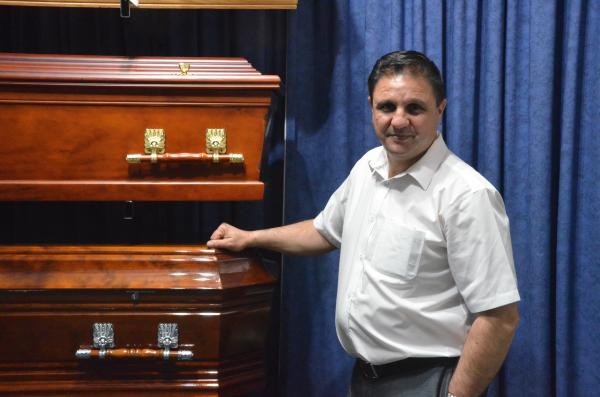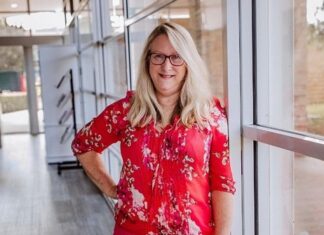Have you ever wondered what it’s like to work at a funeral home? How and why a person would choose such a profession in the first place?
Have you ever wondered about local funeral trends? Or about how much funerals, burials and cremations actually cost?
This week, Warwick and Stanthorpe Today sat down with Carnarvon Funerals Services director Raymond Mattiazzi to have an open conversation about life, death, funerals, and everything in between.
For those who are curious, the conversation between journalist Jess Baker and Ray Mattiazzi went as follows:
J: What led you to becoming a funeral director? What were you doing before?
R: You name it, I was doing it all. My background was retail, (and) hospitality work. I was involved with the International Club for a bit playing soccer. Coincidentally the previous owner of (Carnarvon Funerals) was a member there. I was working there one Saturday afternoon; there was no soccer on. Lo and behold, Herman (the previous owner of Carnarvon) actually rolled up. He started talking and asking if I knew anybody that was looking for a bit of part-time work. Somebody to help (him) in the funeral business. I worked for him casually for four years and then in 2000 he decided that he wanted to retire and he said, ‘do you want to buy the business?’ Well, I knew what I was getting into. And here I am still, 21 years later.
J: Do you think that discussion about death should be more open?
R: It’s very open now. It was just something that people didn’t talk about (20 years ago), whereas now we get pre-need enquiries here every day. People want to have everything ready. Generally it’s the older generation – people retirement age onwards – but then sadly too I’ve had appointments with people with terminal illnesses and they can be in their 50s and 60s.
J: Would you say you’re very clinical about death now, because of your job?
R: I try to be as positive as I can be for these people. It’s hard enough them having to come in here and talk about this, let alone having me a blubbering mess; they really don’t need that. It’s difficult, especially when you know someone well, and the next thing you know you’re having this sort of discussion with them. It certainly tests you psychologically. You look at your own mortality too and think ‘bloody hell, this person here might be a couple of years older than me’. And I’m not that old. Life’s short.
J: What’s the average cost of a funeral in Stanthorpe at the moment?
R: Well, things have gone up. Especially where burials are involved. Cemetery fees have gone up considerably again this year. So you’re looking at, with a burial here and most of the ‘trimmings’ I suppose, anywhere between $8000 and $9500.
J: Do you offer pre-payment plans?
R: We can set up a funeral benefit here. A lot of big companies push pre-need because once you sign up with them you’ve got a contract … an agreement that they’re going to do the funeral. Whereas the way we do it here, we don’t have an inhouse funeral benefit fund. We’re an agent for Sureplan and you can take that out here with us, we’ll set it all up and we’ll keep a file here. The plan follows the client around wherever they go.
J: What percentage of people choose cremation over burial?
R: This year we have surpassed, for the first time in the last 20 years that I’ve kept a record, the number of cremations compared to burials. We’re probably getting up over 70 per cent now (who choose cremation).
J: Why do you think that is?
R: Costs. Another reason too is Covid. People couldn’t attend formal funeral services and they were just opting for direct cremations and then having memorial services at a later date. But it boils down to costs. Cremation’s always going to be a cheaper alternative. Once upon a time, when I first started here, we were probably doing 80 per cent burials, 20 per cent cremation.
J: How much cheaper is cremation than burial?
R: You want a lawn cemetery plot with an interment fee, you’re looking at $3500 for just that. Add that on top of other funeral costs. You could have a formal funeral service without a cemetery plot and cremation involved and that would be about $7000.
J: Is it true that after a certain amount of time a burial spot will free up for another body?
R: Not here. There are cemeteries where your perpetual right could be for 25 years and then that ground is exhumed or reused again. But here, no.
J: What other myths can you bust?
R: There’s always the myths about ‘do they burn the coffin or do they take the bodies out?’ Well they do (burn the coffin) because the crematorium staff don’t want to be, with their workplace health and safety, subject to the handling of deceased persons. When we deliver a cremation, we have a vehicle and the coffin comes out the back, onto a trolley, over to the cremator unit, onto the lift, and up and in it goes once it’s turned on and operating.
People also say ‘well how do you know whose body is in there?’ A cremator unit will only take one coffin at a time. You would never get two in there, it doesn’t work that way. Because of the way our bodies are made up, if you had more than two persons in the cremator, it could actually catch on fire itself .
J: Are you seeing a trend toward more eco-friendly types of burials?
R: We do get asked about it. There are people who are interested more so in being buried in a natural burial ground, not a cemetery as such where you’ve got headstones and plaques. They want nature; they want the trees; they want the birds; they want the grass growing. Just natural Australian bush.
To find out more about the services offered at Carnarvon Funerals, and how the team could help you, contact the organisation on 07 4681 3121 or visit the staff at 31 Wolfram St, Stanthorpe.









